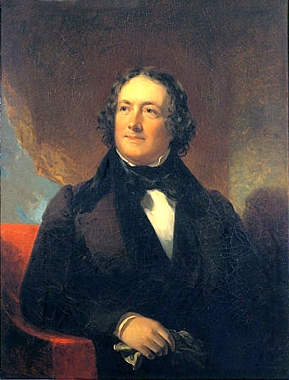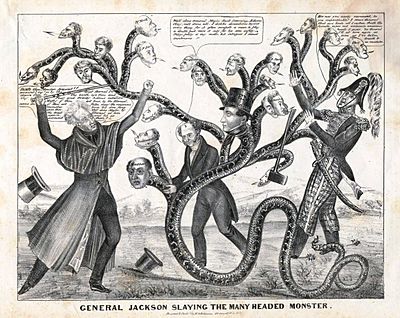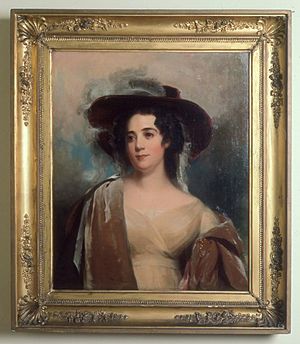Nicholas Biddle facts for kids
Quick facts for kids
Nicholas Biddle
|
|
|---|---|
 |
|
| President of the Second Bank of the United States | |
| In office January 6, 1823 – March 3, 1836 |
|
| President | James Monroe John Quincy Adams Andrew Jackson |
| Preceded by | John Barclay |
| Succeeded by | Position abolished |
| Member of the Pennsylvania State Senate from the 1st district | |
| In office 1813–1815 |
|
| Preceded by | Langdon Cheves |
| Succeeded by | William Maghee |
| Personal details | |
| Born | January 8, 1786 Philadelphia, Pennsylvania, U.S. |
| Died | February 27, 1844 (aged 58) Philadelphia, Pennsylvania, U.S. |
| Political party | Whig |
| Spouse |
Jane Craig
(m. 1811) |
| Children | 6, including Charles |
| Relatives | Charles Biddle (Father) |
| Education | University of Pennsylvania Princeton University (BA) |
| Signature |  |
Nicholas Biddle (born January 8, 1786 – died February 27, 1844) was an important American banker. He was the third and last president of the Second Bank of the United States. This bank was a very powerful financial institution in the early 1800s. Biddle also served in the government of Pennsylvania. He is most famous for his big conflict with President Andrew Jackson, known as the Bank War.
Nicholas Biddle came from a well-known family in Philadelphia. When he was young, he worked for important officials like James Monroe, who later became president. After returning home, he was elected to the state legislature in Pennsylvania. While there, he helped convince Congress and President Monroe to create a new national bank. This bank became the Second Bank of the United States.
In 1822, President Monroe chose Biddle to be the bank's president. Biddle led the bank for many years. He had a lot of power over the country's money supply and interest rates. He tried to prevent economic problems. In 1832, Biddle wanted to renew the bank's special permission from the government. Congress passed the bill, but President Andrew Jackson vetoed it. Jackson did not like banks, especially this powerful national bank. This started a major political fight called the Bank War.
When Jackson moved the government's money out of the national bank, Biddle reacted by raising interest rates. This caused a small economic slowdown. The bank's special permission from the federal government ended in 1836. However, it got a new permission from the state of Pennsylvania. Biddle stayed as president until 1839.
Contents
Early Life and Education
Nicholas Biddle was born in Philadelphia, Pennsylvania, on January 8, 1786. His family was very well-known. His father, Charles Biddle, was important in the American Revolution. He even worked with Benjamin Franklin. Nicholas's uncle, also named Nicholas Biddle, was a naval hero during the Revolutionary War.
Young Nicholas was a very smart student. He went to the University of Pennsylvania. Then he went to Princeton University and graduated in 1801. He was the top student in his class.
Working for the Government
Before finishing his law studies, Biddle got an important job. In 1804, he traveled to Paris, France, as a secretary for John Armstrong Jr.. Armstrong was a U.S. minister to France. While there, Biddle helped with a financial check related to the Louisiana Purchase. This was his first experience with money matters.
Later, he worked as a secretary for James Monroe in England. Monroe was the U.S. minister there. In 1807, Biddle returned to Philadelphia. He worked as a lawyer and wrote for different publications. He even became the editor of a magazine called Port-Folio.
Helping Lewis and Clark
Biddle also helped prepare the famous Lewis and Clark Expedition report for publication. This report was about their journey exploring the western United States. He encouraged President Thomas Jefferson to write an introduction for the report. However, Biddle was elected to the Pennsylvania state legislature in 1810. He had to give the project to another editor, Paul Allen.
Serving in Pennsylvania
Biddle served in the Pennsylvania House of Representatives in 1810. Then he was a member of the Pennsylvania State Senate from 1813 to 1815. He proposed a bill to support public education. This idea was ahead of its time. Even though the bill didn't pass at first, it helped lead to Pennsylvania's public school system later on.
Leading the Bank of the United States
The Bank's Purpose
After joining the Pennsylvania State Senate, Biddle worked hard to get the Second Bank of the United States restarted. This bank was a new version of the First Bank of the United States, which had existed earlier. The First Bank closed in 1811. After the War of 1812, the country faced money problems. So, the Second Bank of the United States was created in 1816.
President James Monroe appointed Biddle as a director of the bank. In 1822, Biddle became the bank's president. As president, Biddle had a lot of power. He controlled the nation's money supply and interest rates. He also lent money to state banks. His goal was to prevent economic problems. Sometimes, he even helped save state banks from failing.
Biddle also played a role in creating Girard College in 1833. This was a free school for poor orphaned boys in Philadelphia. It was set up by his friend and client, Stephen Girard, who was a very rich man and a big investor in the bank.
The Bank War Begins

The Bank War started when President Andrew Jackson began to criticize the bank. In January 1832, Biddle asked Congress to renew the bank's special permission to operate. This was four years before it was set to expire. Supporters of the bank, like Henry Clay, hoped this would make Jackson make a difficult decision before the election.
However, President Jackson was determined. He vetoed the bill to renew the bank's charter. Jackson strongly disliked the bank. He believed it had too much power and was unfair. Biddle and the bank's supporters spent a lot of money trying to defeat Jackson in the 1832 election. But Jackson won reelection anyway.
Jackson's Actions and the Bank's End
In 1833, President Jackson decided to remove the government's money from the bank. His Secretary of the Treasury refused, so Jackson replaced him. The new Secretary of the Treasury, Roger Taney, helped move the public money to several state banks.
When the bank lost the government's money, Biddle decided to raise interest rates. This caused a small economic slowdown from late 1833 to mid-1834. Biddle hoped this would force Jackson to change his mind. But it only made more people dislike the bank. Biddle and his supporters tried many times to renew the bank's charter through Congress. But all their attempts failed because Jackson threatened to veto them.
The bank's federal permission finally expired in April 1836. However, it got a new permission from the state of Pennsylvania. It continued to operate for a few more years. After Biddle resigned in 1839, the bank eventually failed in 1841. Nicholas Biddle died on February 27, 1844.
Family Life
In 1811, Nicholas Biddle married Jane Margaret Craig. They had six children together. One of their sons was Charles John Biddle, who served in the U.S. Army and in the United States House of Representatives.
Nicholas also had a younger brother named Thomas Biddle. Thomas was a veteran of the War of 1812. He worked for the Second Bank's office in St. Louis. Sadly, Thomas died in a duel in 1831. The duel was with a U.S. Representative named Spencer Pettis. Thomas had been upset that Pettis criticized Nicholas and the bank.
Nicholas Biddle's Home
Nicholas Biddle's family home, called "Andalusia", is located in Bensalem Township, Pennsylvania. It is now a National Historic Landmark. This means it is a very important historical place in the United States.
Images for kids



